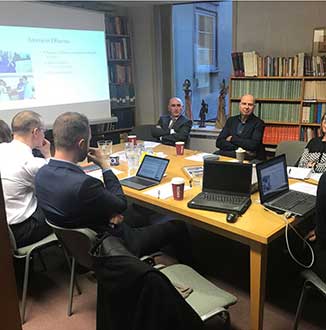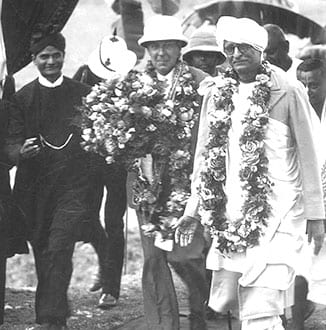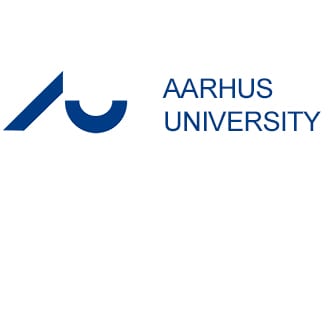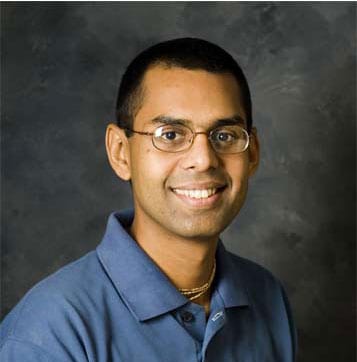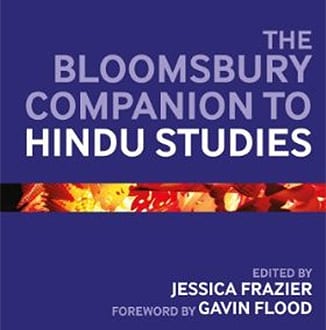by Silje Lyngar Einarsen, PhD student, Aarhus University
Through a Memorandum of Understanding (MoU) by and between the Oxford Centre for Hindu Studies (OCHS) and the Department for the Study of Religion, Aarhus University, Sanskrit students from Aarhus at BA, MA and PhD level have the opportunity to spend a semester in Oxford as visiting students at the centre. The purpose of this short article is to give the reader and interested Sanskrit student an impression of how this programme works at present. The article is based on my own experiences as a visiting student in Oxford during Trinity term 2014. To me, a PhD student of Sanskrit and Religion from a country where the raison d’êtreof the Humanities constantly has to be defended, the term in Oxford was a fantastic experience –a term completely spent in a state of academic bliss. I thereforehope the information provided here also will be useful for the further development of the programme.
I left for Oxford after two years of PhD studies in Denmark including several rounds of fieldwork in India. My PhD project explores the relationship between tradition, text, and ritual in Hindu religious traditions. At the early onset of the study, I chose the core text of the Goddess tradition, theDevīmāhātmyaportion of the Mārkaṇḍeya Purāṇa, as main focus of research. The verses of the Devīmāhātmyaare embedded in a complex ritual routine that has been transferred from teacher to student for generations in India and still are so today. This routine consist of sets of practices that typically are regarded as Tantric, such as identification with the deity, visualisations, imprintments (nyāsa), putting on the armor (kāvaca), etc., accompanied with the recitation of several (to us) lesser known texts and mantras. All of this and more is part of the tradition of the Devīmāhātmya, which I approach trough careful study of the commentary literature, ritual manuals and handbooks, as well as the practical performance routines in present-day India as they are taught from teacher to student. It is a multifaceted study that requires an ability to combine different methods and disciplines, and to apply factual data onto a theoretical level. The time spent at the OCHS greatly contributed to my research in this regard, the latter theoretical challenge in particular. Furthermore, the lectures, seminars and reading groups were very informative and great contributions to the mandatory course-part of the Aarhus Graduate School programme.
Since lectures in Oxford are scheduled primarily in Michaelmas and Hilary terms, whereas the university students take exams in Trinity, I was warned that Trinity was a quiet term and consequently not the best time for a student to visit. However, I soon discovered that quiet in Oxford meant, to me as a student from Denmark, something closer to normal. Not a day passed without something interesting going on at the OCHS, at one of the many colleges, or faculties. It is always something interesting going on somewhere in Oxford. The trick is to catch where and when.
The schedule of lectures and arrangements at the OCHS is published at their website shortly before each term. Students from AU who travels to Oxford in accordance with the MoU can attend all of these lectures and seminars free of charge. The lectures at the centre are oriented towards a Hindu Studies approach; it is a strong emphasis on Hinduism approached through the studies of Sanskrit scriptures, and on theories of Religion (particularly philosophy of Religion). To get an idea of the lecture program, prospective students are advised to look at the previous lectures site on www.ochs.org. Lectures are held in the OCHS library. They are often attended by students and fellows of the Centre alike, and it is likely that they end in interesting discussions continuing long after the scheduled time is up. For this reason, I ended up following all the lectures at the OCHS regularly, even those that did not strictly target my interests.
It was a very pleasant surprise to find out that visiting students easily can follow lectures at the University of Oxford, despite not being enrolled at the University. Lecture lists are published on the website of the respective faculties at the beginning of each term –again, the trick is to look for previous lectures to get an idea of the program. There are many lectures open to public, such as the lectures at the Faculty of Philosophy, which I followed. Smaller classes, for instance in Indian languages at the Oriental Faculty, are restricted to certain participants. In general, if a student that isnot enrolled at the faculty wants to follow these classes, the normal procedure is that the student contacts the lecturer personally. If the lecturer agrees to it, the student is welcome to attend. Obviously, this procedure does not guarantee that the lecturer can or wants to accept outside students, and to avoid disappointment when arriving in Oxford, it could be a good idea to contact the lecturer in advance (but then again, some lecturers apparently “don’t do e-mail”, which means that the student will have to turn up before class and ask in person). It is also possible for visitors to apply for admission to courses formally, but then a heavy fee applies.
In addition to the lectures at the OCHS and the University lectures, the colleges and other research centres also arranges lectures and seminars. In short, there is a myriad of opportunities that makes it possible for visiting student to tailor a schedule fit for his or her academic level and interests. Such freedom and flexibility will most likely confuse a Danish student, who after years of rules and rigidity at the university has been accustomed to the comfort of not having to take initiative and make choices. BA/MA degree students should expect less formal control than they are used to from Denmark, and know that they are responsible for their own learning. They may be surprised to discover that, in Oxford, taking initiative actually pays off.
My affiliation with the OCHS granted me access to the Library of the University of Oxford, the Bodleian Library. Studying at this library would itself have been worth the whole trip to Oxford. Apart from having a copy of every single book published in England, it stores the largest collection of Sanskrit manuscripts outside the Indian subcontinent. For access to the Bodleian Library, visiting students has to bring a letter from the OCHS to the Admissions Office and apply for a library card there. The letter should state the purpose and dates of their stay in Oxford. Sometimes a fee applies. Visiting students get an S-card, which grants access to the whole Bodleian library and all of the reading rooms. Students with an S-card may not check out books from the library, but can keep them on hold in their preferred reading room for as long as they need them.
Access to manuscripts is more complicated and needs to be planned well in advance. The S-card does not give access to manuscripts; for this there is a separate application form to fill out at the Admission Office. The application needs to be completed with a letter from the student’s supervisor or tutor stating the nature of the research for which the manuscript is requested. Visiting students determined to get access to manuscripts, are advised to contact the Superintendent of the Special Collection well in advance and ask for the exact routines.
Finally, a word should be said on the inspiring milieu at the OCHS. The OCHS has a very open and welcoming atmosphere. I felt instantly included, and it was easy to approach the staff and fellows for practical or academic advice. I was under the impression that people at the Centre genuinely took interest in my research, and I had the privilege to discuss my PhD-project withacademic directorProf. Gavin Flood and other brilliant scholars and students. The Wednesday lunch is indeed a great opportunity to network with scholars and socialise with other students–many Sanskrit and Theology students from Oxford University attend these lunches. Moreover, there is a very lively graduate student milieu in relation to the Centre, and graduate seminars in Indic Religions are arranged on a weekly basis in the OCHS library. To put it succinctly: participating in this programme is a great privilege and a rare opportunity made possible by the staff and fellows of the OCHS. I hope to see more Aarhusianian Sanskritists in Oxford over the coming years.
